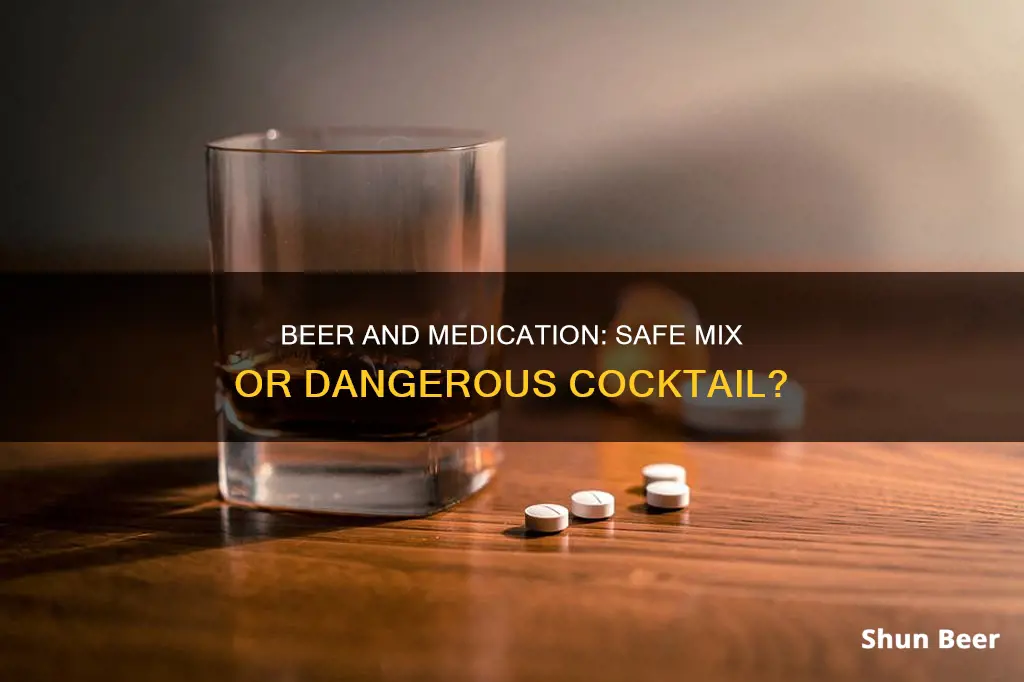
Drinking alcohol while taking medication can be dangerous and even life-threatening. Alcohol can change how a medication works and intensify its side effects. It can also increase the risk of overdose and, in some cases, cause liver damage. The combination of medication and alcohol can lead to adverse health effects such as nausea, vomiting, headaches, drowsiness, fainting, loss of coordination, internal bleeding, heart problems, and difficulties in breathing. It is important to consult a doctor or pharmacist to understand the specific interactions and risks associated with alcohol and the medication you are taking. Factors such as age, sex, metabolism, alcohol tolerance, and individual health history also play a role in determining the safety of mixing alcohol and medication.
| Characteristics | Values |
|---|---|
| Should you take medicine after drinking beer? | It depends on the type of medicine. |
| Common effects of mixing alcohol and medicine | Nausea, vomiting, headaches, drowsiness, fainting, loss of coordination, internal bleeding, heart problems, difficulties in breathing, liver damage, etc. |
| Alcohol's effect on medication | Alcohol can make a medication less effective, harmful, or toxic. It can also increase the medication's concentration in the blood to toxic levels. |
| Who is at greater risk? | Women and older people are at a higher risk of harmful alcohol-medication interactions. |
What You'll Learn

The dangers of mixing alcohol with prescription drugs
Mixing alcohol with prescription drugs can have dangerous consequences, ranging from increased side effects to life-threatening symptoms, overdose, and even death. Here are some of the dangers associated with mixing alcohol with prescription medications:
- Increased Side Effects: Alcohol can intensify the side effects of certain medications, such as drowsiness, dizziness, impaired motor control, and changes in behaviour. This can lead to an increased risk of falls, accidents, and impaired judgment.
- Liver Damage: Alcohol, when combined with certain medications, can increase the risk of liver damage. This is especially true for drugs that already carry a risk of liver toxicity, such as cholesterol-lowering medications and some painkillers.
- Internal Bleeding: Drinking alcohol while taking certain medications can increase the risk of internal bleeding. This includes blood thinners, such as warfarin, and non-steroidal anti-inflammatory drugs (NSAIDs) like aspirin and ibuprofen.
- Stomach Problems: Alcohol can interact with medications to cause stomach upset, bleeding, and ulcers. This is a common issue with painkillers, arthritis medications, and antibiotics.
- Cardiovascular Issues: Mixing alcohol with certain drugs can lead to cardiovascular problems, including rapid heartbeat, sudden changes in blood pressure, and heart problems such as arrhythmia. This is a concern with blood pressure medications and some antibiotics.
- Respiratory Depression: Alcohol can increase the risk of slowed or difficult breathing when combined with certain medications, including opioids and anxiety drugs. This can be life-threatening and requires immediate medical attention.
- Drug Interactions: Alcohol can interact with medications in various ways. It can make some drugs less effective, or it can increase their concentration in the blood to toxic levels. Alcohol can also affect how the body absorbs medications in the digestive tract.
- Older Adults at Higher Risk: Aging slows down the body's ability to metabolize alcohol, so it stays in the system longer. Older adults are also more likely to be taking multiple medications that may interact with alcohol, increasing the risk of harmful reactions.
- Individual Factors: Factors such as age, sex, metabolism, and alcohol tolerance can influence the effects of mixing alcohol with medications. Women generally have a higher risk for problems due to differences in body composition and alcohol metabolism.
- Over-the-Counter Medications: The dangers of mixing alcohol with prescription drugs are well known, but even over-the-counter medications can be unsafe when combined with alcohol. Common over-the-counter drugs like painkillers, allergy medications, and cold and flu remedies can have serious interactions with alcohol.
Beer and Flagyl: Safe After 30 Hours?
You may want to see also

How long after drinking alcohol can you take medicine?
It is generally advised to avoid drinking alcohol when taking medications. Mixing alcohol and medication can lead to serious health consequences, including overdose and even death. The combination can cause harmful effects such as nausea, vomiting, headaches, drowsiness, fainting, loss of coordination, internal bleeding, heart problems, and difficulties in breathing. Alcohol can also make a medication less effective or even useless, or it may make the medication harmful or toxic to your body.
The timing of consuming alcohol in relation to taking medication is important. Alcohol and medications can cause harmful effects even if they are not taken simultaneously. Sometimes, you may be able to drink a few hours after taking a medication, while other times you may need to wait a few days or longer. It is crucial to consult with a medical professional or pharmacist to determine the safe timing for your specific medication.
The safe period between drinking alcohol and taking medication depends on several factors, including the type of medication, the type and amount of alcohol consumed, your age, sex, and individual health factors. As people age, alcohol stays in their system longer due to a slower metabolism. Additionally, older adults are more likely to be taking multiple medications that could interact with alcohol.
Women generally have a higher risk for problems related to mixing alcohol and medication. This is because women's bodies typically have a lower water content, resulting in a higher concentration of alcohol in their bloodstream compared to men consuming the same amount. As a result, women are more susceptible to alcohol-related organ damage, particularly to the liver.
It is crucial to consult with a healthcare provider or pharmacist to understand the specific interactions and safe waiting periods for your medications. They can provide personalized guidance based on your health status and the medications you are taking.
Heart Stents and Beer: Is It Safe?
You may want to see also

Alcohol and medicine: the risks for older people
Mixing alcohol with medication can be a dangerous combination for anyone, but older people are particularly at risk. As we age, alcohol stays in our system longer because we metabolise it more slowly. Older people are also more likely to be taking medication that could interact with alcohol.
According to the National Institute on Alcohol Abuse and Alcoholism, there are several reasons why it can be harmful to mix alcohol and medication. Alcohol can change how a medication works, and certain drugs can change how you feel the effects of alcohol. Alcohol can make some medications less effective by interfering with how they are absorbed in the digestive tract. In some cases, alcohol increases the bioavailability of a drug, which can raise the concentration of the medication in your blood to toxic levels.
Drinking alcohol can also make the side effects of a medication worse or even cause new symptoms. This is especially true if you are taking a medication that makes you sleepy or causes sedation. More intense side effects mean you might be more impaired after having one drink than you would usually be.
Older adults, especially those taking more than one medication, are more likely to experience problems, as the ability to clear both alcohol and drugs from the body is reduced with age.
- Allergy, cold, and flu medications: These drugs can cause excessive drowsiness, and when combined with alcohol, you are at even more risk of accidents. They also pose an increased risk of overdose.
- Antibiotics and antifungals: Alcohol can make the unpleasant side effects of these drugs worse, including a fast heartbeat, sudden changes in blood pressure, stomach pain, upset stomach, vomiting, headache, or redness in the face. Mixing isoniazid and ketoconazole with alcohol can also cause liver damage.
- Antidepressants: Antidepressants can cause drowsiness and dizziness, which can be made worse by alcohol. This can raise your risk of falls and car accidents. Mixing antidepressants with alcohol can also increase feelings of depression or hopelessness.
- Anxiety and epilepsy medications: Mixing these drugs with alcohol can cause drowsiness, dizziness, slowed or laboured breathing, problems with motor functions, behaviour, and memory. Plus, mixing these meds with alcohol increases the risk of overdose.
- Arthritis medications: When combined with alcohol, arthritis medicines can cause ulcers, stomach bleeding, and liver damage.
- Attention and concentration drugs: When combined with alcohol, these medications can make a person dizzy and sleepy. Combining alcohol with certain attention and concentration drugs can worsen concentration or increase a person's risk of heart problems. Liver damage can also occur.
- Blood pressure medications: When mixed with alcohol, these medications can cause dizziness, fainting, drowsiness, and irregular heartbeats.
- Blood thinners: Since alcohol consumption makes falling or getting an injury that includes bleeding more likely, drinking should be avoided while taking blood thinners. People who drink occasionally may have internal bleeding while taking this medication, and people who drink heavily may experience internal bleeding or bleeding disorders. There is also a risk of blood clots, strokes, or heart attacks.
- Cholesterol-lowering medications: Drinking large amounts of alcohol with these drugs may increase your risk of liver damage.
- Diabetes medications: Alcohol and diabetes medications can cause a person's blood sugar to go too low. Some people may experience nausea, vomiting, headache, rapid heartbeat, and sudden changes in blood pressure.
- Pain medications: Combining pain medications with alcohol can cause stomach upset, bleeding, ulcers, rapid heartbeat, and liver damage.
- Muscle relaxants: When paired with alcohol, muscle relaxants can cause drowsiness and dizziness. A person's risk of seizures and overdose goes up, and breathing can become difficult or slowed. Impaired motor control, unusual behaviour, and memory problems are also observed.
- Sleeping pills: When combined with alcohol, sleeping pills can cause drowsiness and dizziness. Breathing may slow or become difficult. People can also have problems with motor control, memory, and behaviour.
If you are not sure about the safety of combining alcohol and any medications you're taking, talk with a healthcare provider to get answers specific to your health and medical history.
Beer and Keto: What's the Verdict?
You may want to see also

Mixing alcohol with over-the-counter medicines
Even some herbal remedies can have harmful effects when combined with alcohol. For example, Kava Kava, an herbal preparation used to treat anxiety and epilepsy, should not be used with alcohol due to the risk of liver damage and drowsiness. Similarly, herbal sleep remedies like chamomile, valerian, and lavender can cause increased drowsiness when mixed with alcohol.
Some over-the-counter painkillers, such as ibuprofen and paracetamol, are usually safe to consume with a small amount of alcohol, provided you get advice from a pharmacist or doctor. However, it is important to note that taking more than the recommended dose of these painkillers can increase the risk of severe side effects, and drinking more than the recommended limits of alcohol may lead to bleeding from the stomach.
It is also important to consider individual factors when mixing alcohol with over-the-counter medications. For example, women tend to have higher blood alcohol levels than men after drinking the same amount, as alcohol mixes with body water, and women generally have less body water than men. As a result, women are more susceptible to alcohol-related organ damage, such as liver damage.
Additionally, older people are at a higher risk of harmful interactions between alcohol and over-the-counter medications. Aging slows down the body's ability to break down alcohol, so it remains in the system longer. Older individuals are also more likely to be taking multiple medications that may interact with alcohol.
Therefore, it is crucial to consult with a healthcare provider or pharmacist before consuming alcohol with any over-the-counter medication to ensure your safety and avoid potential harmful interactions.
Drinking Beer on Key West's Sidewalks: What's Allowed?
You may want to see also

Side effects of mixing alcohol and medicine
Mixing alcohol and medicine can have a range of side effects, from mild to life-threatening. The specific effects depend on the type of medication, the amount of alcohol consumed, and individual factors such as age and sex. Here are some of the potential side effects of mixing alcohol with medication:
- Drowsiness and dizziness: Alcohol can enhance the sedative effects of certain medications, leading to increased drowsiness and dizziness. This can impair judgment, increase the risk of accidents, and affect an individual's ability to drive or operate machinery safely.
- Changes in blood pressure and heart rate: Alcohol can interact with blood pressure medications and certain antibiotics, causing rapid heartbeat and sudden changes in blood pressure. It can also affect the metabolism of warfarin, a common blood thinner, increasing the risk of internal bleeding.
- Stomach problems: Mixing alcohol with certain medications can lead to stomach upset, bleeding, ulcers, and liver damage. This is particularly true for medications like aspirin, acetaminophen (paracetamol), and non-steroidal anti-inflammatories (NSAIDs) such as ibuprofen.
- Increased risk of overdose: Alcohol can increase the effects of certain medications, leading to a higher risk of overdose. This is true for both prescription medications and over-the-counter drugs, including antihistamines and painkillers.
- Breathing difficulties: Mixing alcohol with certain medications can slow or impair breathing. This includes opioids, muscle relaxants, and sleep aids. The combination of alcohol and opioids can be particularly deadly, as it can lead to respiratory depression and even stop a person's breathing.
- Impaired motor control and memory problems: Alcohol can worsen the side effects of certain medications, leading to impaired motor control, memory loss, and abnormal behavior. This is a concern with medications used for anxiety, epilepsy, and sleep disorders.
- Mental health issues: Mixing alcohol with antidepressants and other mental health medications can increase feelings of depression or hopelessness. It can also worsen the symptoms of mental health conditions and impair judgment.
- Liver damage: Alcohol can increase the risk of liver damage when combined with certain medications, including arthritis medicines and cholesterol-lowering drugs.
- Other health complications: Alcohol can interact with medications for diabetes, leading to low blood sugar levels, nausea, vomiting, and changes in blood pressure. It can also affect the effectiveness of antibiotics, potentially interfering with their ability to clear infections.
It is important to note that these are not all-inclusive lists, and the potential side effects of mixing alcohol and medication vary widely depending on the specific medication and individual factors. It is always best to consult with a healthcare provider or pharmacist before consuming alcohol while taking any medication.
Beer Left Out: Still Drinkable?
You may want to see also
Frequently asked questions
It depends on the type of medicine and how much beer you've consumed. It's important to consult a doctor or pharmacist for personalised guidance. However, as a general rule, it's best to avoid taking medicine after drinking beer, as this can lead to harmful interactions and side effects.
Mixing medicine and alcohol can cause various side effects, including nausea, vomiting, headaches, drowsiness, fainting, loss of coordination, internal bleeding, heart problems, and breathing difficulties. It can also increase the risk of overdose and may make the medication less effective or even harmful to your body.
Yes, certain types of medications are particularly dangerous to mix with alcohol. These include allergy, cold, and flu medicines; antibiotics and antifungals; anxiety and epilepsy medications; attention and concentration drugs; blood pressure medications; cholesterol-lowering drugs; diabetes medications; muscle relaxants; opioid painkillers; and sleeping pills. It's important to consult a healthcare professional or read the medication label for specific information.







